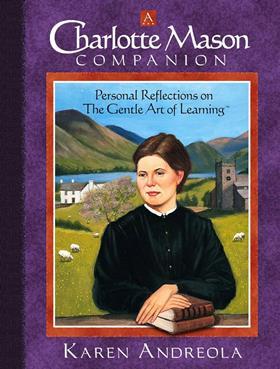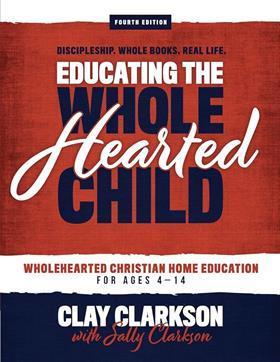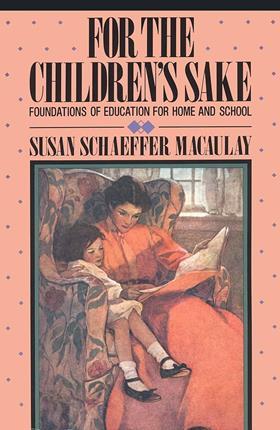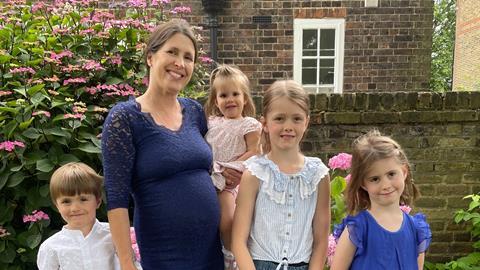Holly Wright explains why she feels she is partnering with God as she educates her four children outside of mainstream schooling
My husband, Phil and I wanted a biblical worldview to be the bedrock of our children’s education. When our first child was approaching school age, we were unable to get her a place at our local Church of England primary school due to not living near enough to it. I also felt that age four was too young to begin formal education (in New Zealand, where I am from, children start when they are five). So, we decided to try homeschooling for the first couple of years and see how it went.
I had also been very inspired by Sally Clarkson (author of The Mission of Motherhood and The Lifegiving Home series) who had homeschooled her four children. As we were considering homeschooling, we got to know a lovely couple who had just started coming to our church. Their daughter had been homeschooled and said it was a really positive experience. She had gone on to study at Oxford University. It was helpful to meet her parents and glean some wisdom from them as we commenced our homeschool journey.
It became clear very quickly that homeschooling was God’s ‘Plan A’ and, while we felt we would take it year by year, with each passing year I feel an ever-stronger conviction that this is his long-term vision for our family. I feel very much in partnership with what God is doing in our family as I educate my children at home, by his grace and through the daily leading and equipping of the Holy Spirit.
Individualised instruction and unhurried time
Our four children are now nine, seven, five and two, and we have another little one almost due. Some high points from our homeschooling experience include the blessing of being able to give them one-to-one individualised instruction, which has been especially beneficial for maths and when first learning to read.
Having lots of time to read aloud to the children has been invaluable – we’ve loved spending that time as a family, all of us together enjoying the same books, and later hearing the stories retold through their imaginative play. Memorising beautiful poems together and acting them out in serious or silly ways has brought lots of laughter. When one of my children completes a grade or masters the basics of learning to read we all celebrate with an outing or an ice cream. The siblings cheer one another on and genuinely share the joy of celebrating that particular child.
I love being able to enjoy unhurried time with each of my children, without the morning rush for school drop-offs or having to wake the baby for school pick-ups. Seeing the siblings growing together, doing life together, the older ones encouraging, nurturing and helping the younger ones is precious, as are the opportunities for meaningful conversations throughout every day, particularly ones pertaining to God in relation to different subjects we study. We also enjoy developing close friendships with other homeschooling families.
Homeschooling philosophies
There are many different philosophies among home-educating families. I was really attracted to Charlotte Mason’s educational philosophy after reading Susan Schaeffer MacCauley’s book For the Children’s Sake (Crossway).
Charlotte was a teacher in the Lake District in the late 1800s. She believed that the home environment, cultivating good habits (especially habits of character) and reading ‘living books’ (as opposed to dry textbooks) were essential for educating the ‘whole person’. A ‘living book’ is written by one author about a particular subject, and sparks the imagination of the child, such as a story about a child growing up in Holland during the Second World War, a scientist who studies shark behaviour, a biography about Bach etc. Rather than filling in multiple choice questions about what has been read, the child narrates or ‘tells back’ the story in their own words. Handwriting and spelling are learned through copying passages from great books that communicate beautiful ideas (such as excerpts from the Bible, quotes from famous speeches, Aesop’s fables, Shakespeare), rather than using lists of words.
Charlotte Mason also encouraged spending as much time as possible outside, nature study, learning a handicraft (eg knitting), studying the work of great artists and composers, singing and foreign languages.
Classical conversations
While happily homeschooling using Charlotte’s principles, I later discovered Classical Conversations (CC), a Christ-centred homeschool curriculum rooted in the classical model. I noticed how this model is in tune with the way children naturally learn, for example in the early ‘grammar’ years, CC emphasises memorisation of history, maths, science, English, Bible and Latin facts through singing. It was already clear to me that my children seemed to naturally love (and excel at) memorisation through singing, and that it was their natural instinct to want to do so. So CC seemed a great ‘fit’ for our family and complimented what we were already doing.
Finding like-minded families
We joined a community of 15 other Christian homeschooling families with whom we meet up once a week. The children learn, grow and have fun together. They give verbal presentations to their group each week, do science experiments, art, maths games, sing their weekly memory work and learn grammar, sentence diagramming and essay-writing skills together.
We recently went on a seaside holiday with our CC community – 34 adults and 49 children! Prior to discovering CC, we connected with other homeschool families through WhatsApp home-ed groups and word-of-mouth home-ed field trips (eg at museums, art galleries, organised sports events).
Connecting faith with learning
Our faith connects with homeschooling beautifully. A biblical worldview underpins every subject I teach our children, and I see this especially in history (when we look at the way God has raised up and torn down leaders and empires over time), and in science (when we study his perfect design, evident in every aspect of his creation). We seek to honour God in the books we choose to read (including the children’s early phonics readers, the various series our children read independently and the books we read aloud as a family).
We are free to spend time reading the Bible, memorising scripture and singing hymns together. It is my desire that my children will grow to be self-directed learners, hungry to continue learning and growing throughout their whole lives. It is my prayer that they will grow into secure and confident adults, with their identity and worldview rooted and grounded in Jesus, that they will confidently trust in the authority of Scripture, regardless of what the culture around them is doing or saying. I hope they will desire to walk in God’s ways, that they will boldly share the gospel, be ready at all times to give the reason for the hope they have, and compassionately serve others out of their love for God.
Online support
Top three recommendations for books about homeschooling

A Charlotte Mason Companion by Karen Andreola (Charlotte Mason Research & Supply co)

Educating the Wholehearted Child by Clay and Sally Clarkson (Whole Heart Press)

For the Children’s Sake by Susan Schaeffer Macaulay (Crossway)
Homeschooling resources
Spelling: Spelling Wisdom series by Simply Charlotte Mason
Grammar: Fix It! Grammar by Institute for Excellence in Writing (IEW)
Essay writing: History-based writing lessons by IEW
Poetry: Linguistic development through poetry memorisation by IEW
Maths: Rightstart Mathematics curriculum
Science: Generations curriculum by Kevin Swanson, including God Made Everything, God Made Animals’, God Made Life, God Made the World
History: Story of the World series by Susan Wise Bauer
Latin: Song School Latin series by Amy Rehn
Handwriting: Copywork series by Simply Charlotte Mason (including Delightful Handwriting, Hymns in Prose, Print to Cursive through Proverbs)
Art and composer study: Simply Charlotte Mason
Habits of character: Our 24 Family Ways by Clay Clarkson (Whole Heart Press)
Christian audiobooks: Lamplighter Ministries ‘Building Christ-like character one story at a time’
The classical approach: Classical Conversations (CC) curriculum and join a CC community!
Children’s Bible: The Child’s Story Bible by Catherine F Vos (William B Eerdmans Publishing Co)
Scripture memorisation: The Memory Bible (with CD) by Stephen Elkins (Integrity)
Christian doctrine: Leading Little Ones to God by Marian M Schooland (William B Eerdmans Publishing Co)
Reading for parents: The Convivial Homeschool by Mystie Winckler (Convivial Press)
For the Family’s Sake by Susan Schaeffer Macaulay (Crossway)
Habits of the Household by Justin Whitmel Earley (Zondervan)
Hold On to Your Kids: Why parents need to matter more than peers by Gordon Neufeld (Balantine)
Teaching from Rest by Sarah MacKenzie (Classical Academic Press)





























No comments yet